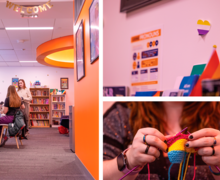Officials create partnership with university in Saudi Arabia
The influence of Syracuse University’s School of Information Studies is global, now stretching all the way to the Middle East through a formal partnership with the all-female Effat University in Saudi Arabia.
The continually developing relationship with Effat is part of a broader, global outreach initiative within the iSchool, said Paul Gandel, an iSchool professor and key contributor to the project. The school also collaborates with institutions in Rwanda, Uganda and Malaysia.
“The world is becoming more and more global and multinational,” he said. “The key to anyone’s success in the world today is what probably can be best referred to as cultural intelligence, in the sense of understanding various cultures, various areas and being comfortable working in multiple cultures.”
This is evident in the recent partnership with Effat, he said. The partnership was finalized when a group of representatives from Effat and from the royal family of Saudi Arabia came to campus on March 6.
The partnership continues the curriculum-based relationship that has developed between the two institutions throughout the past year and a half, and also opens the door for broader, more mutually beneficial interactions that could include student exchanges, research collaboration or joint classes.
The partnership developed when officials from Effat, which was founded 14 years ago, sought outside consultation for its information systems curriculum about a year and a half ago, Gandel said.
“Effat University is, compared to Syracuse, a fairly young program. They’re shaping their program and their curriculum,” he said. “They came to Syracuse as an older and more established program.”
In addition, SU holds the No. 1 ranking in information systems on the U.S. News and World Report list of best graduate schools, which Gandel said made SU a natural choice as a partner with Effat.
But the iSchool’s role in validating and shaping Effat’s curriculum does not only benefit the Saudi Arabian institution, he said.
“It’s really a two-way sharing,” he said. “We learn as much by reviewing their curriculum, and get new ideas, as they learn from us.”
Cultural exchanges are also a benefit of the partnership, said Sarah Inoue, program manager for international development. The partnership may provide an opportunity to look into the role of women in science, technology, engineering, and mathematics fields, for example, which differs between the United States and Saudi Arabia, she said.
While women have less representation than men in these areas in the United States, she said Effat has no trouble recruiting women to the technology field. Cross-cultural ties may help identify and address the values that make the field popular or unpopular in each country, she said.
The current agreement will last four years, Inoue said, at which point it will be re-evaluated and adjusted accordingly. In addition to representing a students’ full time in college, the four-year time frame will give school representatives sufficient time to further develop and expand the relationship, she said.
Inoue said she hopes students at the respective universities will become more active in the partnership throughout its term. This could include having Effat students enroll in the iSchool’s graduate programs, developing opportunities for SU students to travel to Saudi Arabia or creating collaborative faculty research projects.
“Coordinating students in two time zones, with two very different cultural schedules, may prove to be impossible,” she said, “but we would like to try.”
If nothing else, she said, the partnership will allow faculty members to bring a global perspective to iSchool classrooms.
Said Inoue: “I think it’s really mutually beneficial, and I’m really hopeful that students will be able to be involved.”
Published on March 19, 2013 at 11:44 pm





